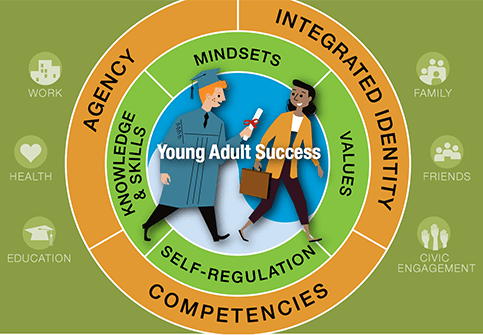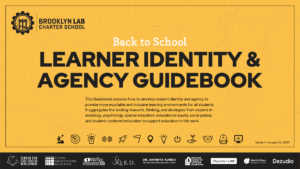Success Takes Agency, Identity, and Competency

Academic skills are not the only thing a child needs to succeed in life according to a new report.
Young adult success takes agency, an integrated identity, and competencies. Drawing on research from many fields, theory and practice to identify building blocks for life success, The University of Chicago Consortium on Chicago School Research developed a framework for youth development.
Success is more than work readiness, according to the report, it, “Also means that young people can fulfill individual goals and have the agency and competencies to influence the world around them.”
The report defines success as workforce goals that are associated with college and career readiness and also identifies broader goals for learning:
“While building an educated workforce is one of the core goals of our investments in young people, it is far from the only goal. Success also means that young people can fulfill individual goals and have the agency and competencies to influence the world around them. This broader definition of success is based on the synthesis of literature from various fields, as well as interviews with practice experts and youth service providers, who articulated their larger role as helping young people develop an awareness of themselves and of the wide range of options before them, competencies to pursue those options, and the ability to make good future choices for their lives as engaged citizens in the world. This larger focus is inseparable from goals related to college and career.”
We think it’s important for parents to keep in mind that although our culture tends to reward success as a “good job” or attendance at a “good college,” in our hearts parents understand that success is in fact broader and more nuanced than that. And we heard this over and over in our Smart Parents blog series as well. Inspiring lifelong learning, and cultivating joy, curiosity and happiness are related to college and career success but are also more all encompassing.
Sponsored by the Wallace Foundation, the report says, children need four qualities that parents, teachers, after school professionals and other adults can help shape:
- Self-regulation. The awareness of oneself and one’s surroundings, and management of one’s attention, emotions and behaviors to achieve goals.
- Knowledge and Skills. information or understanding about oneself, other people and the world, and the ability to carry out tasks.
- Mindsets. Beliefs and attitudes about oneself, the world and the interaction between the two. They are the lenses individuals use to process everyday experiences.
- Values. Enduring, often culturally-defined, beliefs about what is good or bad and what one thinks is important in life.
Parents and educators can nurture these qualities providing children and teens with rich experiences, and ensuring that young people have opportunities to reflect on the experiences. A key problem, according to the report, is that disadvantaged youth often face extra challenges, including fewer opportunities for consistent, positive developmental experiences and relationships.
The report is thoughtful regarding learner experience suggesting, “The intentional provision of opportunities for young people to experience, interact, and make meaning of their experiences the central vehicle for learning and development.”
Context is acknowledged as a primary factor in shaping how children develop and in the opportunities they can access.
For more, check out:






0 Comments
Leave a Comment
Your email address will not be published. All fields are required.